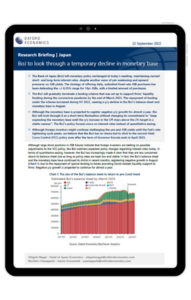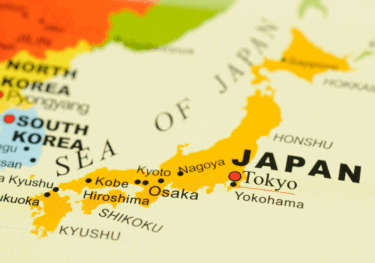BoJ to look through a temporary decline in monetary base
 The Bank of Japan (BoJ) left monetary policy unchanged at today’s (22nd Sep) meeting, maintaining current short- and long-term interest rates, despite another wave of yen weakening and upward pressures on JGB yields. The strategy of offering daily, unlimited fixed-rate JGB purchases has been defending the +/-0.25% range for 10yr JGBs, with a limited amount of purchases.
The Bank of Japan (BoJ) left monetary policy unchanged at today’s (22nd Sep) meeting, maintaining current short- and long-term interest rates, despite another wave of yen weakening and upward pressures on JGB yields. The strategy of offering daily, unlimited fixed-rate JGB purchases has been defending the +/-0.25% range for 10yr JGBs, with a limited amount of purchases.
What you will learn:
- The BoJ will gradually terminate a lending scheme that was set up to support firms’ liquidity funding during the coronavirus pandemic by the end of March 2023. The repayment of lending under the scheme increased during H1 2022, causing a y/y decline in the BoJ’s balance sheet and monetary base in August.
- Although the monetary base is projected to register negative y/y growth for almost a year, the BoJ will look through it as a short-term fluctuation without changing its commitment to “keep expanding the monetary base until the y/y increase in the CPI stays above the 2% target in a stable manner”. The BoJ’s policy focuses more on interest rates instead of quantitative easing.
- Although foreign investors might continue challenging the yen and JGB yields until the Fed’s rate tightening cycle peaks, we believe that the BoJ has no choice but to stick to the current Yield Curve Control (YCC) policy even after the term of Governor Kuroda ends in April 2023.
Tags:
Related posts

Post
Tariffs and Politics Leave the BoJ Powerless in Japan
The Bank of Japan kept its policy rate at 0.5% at its July meeting. We continue to think the BoJ will exercise caution on rate hikes despite still-high inflation and a recent trade deal with the US.
Find Out More
Post
US-Japan Trade Deal Fails to Shift Japan’s Growth Outlook
We estimate that the US's effective tariff rate on Japanese products is around 17%, in line with our baseline assumption. Lower tariffs on autos are a positive, given the sector's significant contribution to the economy and its broad domestic supporting base
Find Out More
Post
Japan’s Rising Political Instability Will Undermine Fiscal Discipline
The ruling Liberal Democratic party (LDP) and its partner Komeito lost their majority in Japan's upper house elections on July 20. Although Prime Minister Shigeru Ishiba will likely stay to avoid political gridlock, especially to complete tariff negotiations with the US, the political situation has become fluid and could lead to a leadership change or the reshuffling of the coalition.
Find Out More